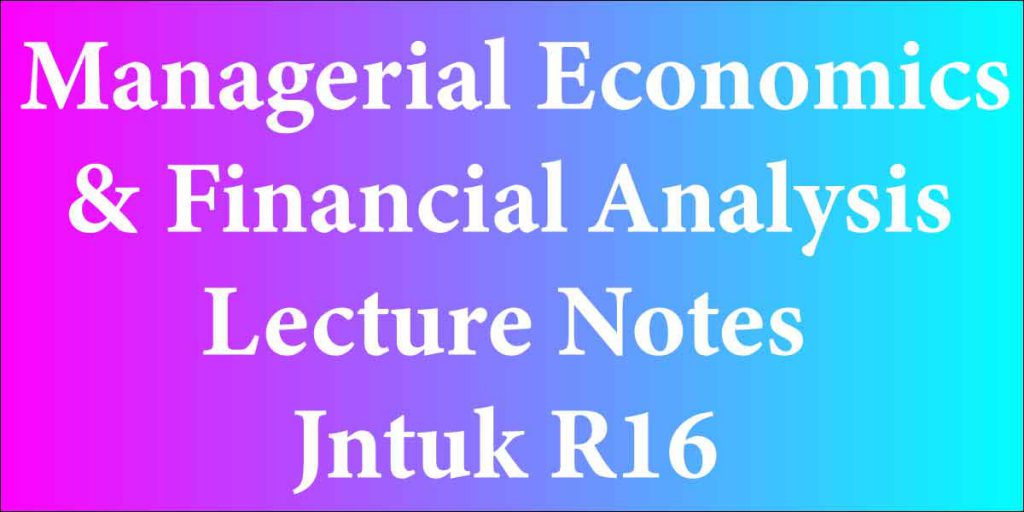Managerial Economics & Financial Analysis
Course Objectives:
• the educational objectives of this paper is to grasp the idea and nature of social control political economy and its relationship with alternative disciplines and conjointly to grasp the idea of Demand and Demand statement, Production operate, Input Output relationship, Cost-Output relationship and Cost-Volume-Profit Analysis.
• to grasp the character of markets, ways of evaluation within the completely different market structures and to grasp the various kinds of business organisation and therefore the idea of Business Cycles.
• to find out completely different Accounting Systems, preparation of economic Statement and uses of various tools for performance analysis. Finally, it’s conjointly to grasp the idea of Capital, Capital Budgeting and therefore the techniques wont to appraise Capital Budgeting proposals.
UNIT-I
Introduction to social control political economy and demand Analysis: Definition of social control political economy –Scope of social control political economy and its relationship with alternative subjects – idea of Demand, forms of Demand, Determinants of Demand- Demand schedule, Demand curve, Law of Demand and its limitations- snap of Demand, forms of snap of Demand and Measurement- Demand statement and ways of statement..
UNIT – II
Production value|and price|and value} Analyses: idea of Production operate- Cobb-Douglas Production function- Leontief production function – Law of Variable proportions-Isoquants and Isocosts and selection of least value issue combination-Concepts of Returns to scale and Economies of scale-Different cost concepts: chance prices, express and implicit prices- fastened costs, Variable prices and Total prices –Cost –Volume-Profit analysis-Determination of Breakeven purpose(simple problems)Managerial significance and limitations of Breakeven point.
UNIT – III
Introduction to Markets, Theories of the Firm Policies: Market Structures: excellent Competition, Monopoly, noncompetitive competition and market – options – worth and Output Determination – social control Theories of firm: Marris and Williamson’s models – alternative ways of Pricing: cost evaluation, Limit evaluation, Market Skimming evaluation, net evaluation: Flat Rate Pricing, Usage sensitive evaluation and Priority evaluation.
UNIT – IV
forms of business organisation and Business Cycles: options and analysis of Sole dealer, Partnership, Joint Stock Company – State/Public Enterprises and their forms – fluctuations : that means and options – Phases of Business Cycle.
UNIT – V
Introduction to Accounting Analysis: Introduction to bookkeeping Systems – Preparation of economic Statements-Analysis and Interpretation of economic Statements-Ratio Analysis – Preparation of Funds flow and income statements (Simple Problems)
II Year – I Semester
L T P C
4 0 0 3
MANAGERIAL political economy AND monetary ANALYSIS
UNIT – VI
Capital and Capital Budgeting: Capital Budgeting: that means of Capital-Capitalization-Meaning of Capital Budgeting-Time price of money- ways of critical Project profitability: ancient Methods(pay back amount, accounting rate of return) and fashionable methodologys(Discounted income method, web gift price methodology, Internal Rate of come methodology and gain Index)
Course Outcome:
*The Learner is supplied with the data of estimating the Demand and demand elasticities for a product and therefore the data of understanding of the Input-Output-Cost relationships and estimation of the smallest amount value combination of inputs.
* One {is conjointly|is additionally} able to perceive the character numerous} markets and worth Output determination beneath various market conditions and also to own the data of various Business Units.
*The Learner is ready to arrange monetary Statements and therefore the usage varied|of varied|of assorted} Accounting tools for Analysis and to guage various investment project proposals with the assistance of capital budgeting techniques for higher cognitive process.
TEXT BOOKS
one. Dr. N. AppaRao, Dr. P. Vijay Kumar: ‘Managerial political economy and monetary Analysis’, Cengage Publications, New Delhi – a pair of011 2. Dr. A. R. Aryasri – social control political economy and monetary Analysis, TMH 2011 3. Prof. J.V.Prabhakararao, Prof. P. Venkatarao. ‘Managerial political economy and monetary Analysis’, Ravindra Publication.
REFERENCES:
- Dr. B. Kuberudu and Dr. T. V. Ramana: social control political economy Analysis, Himalaya business firm, 2014.
- V. Maheswari: social control political economy, grand Turk Chand.2014
- Suma Damodaran: social control political economy, Oxford 2011.
- VanithaAgarwal: social control political economy, Pearson Publications 2011.
- Sanjay Dhameja: monetary Accounting for Managers, Pearson.
- Maheswari: monetary Accounting, Vikas Publications.
- S. A. Siddiqui& A. S. Siddiqui: social control political economy and monetary Analysis, New Age International Publishers, 2012
- Ramesh Singh, Indian Economy, 7th Edn., TMH2015
- Pankaj Tandon A Text Book of economics Theory, Sage Publishers, 2015
- Shailaja Gajjala and Usha Munipalle, Univerties press, 2015

